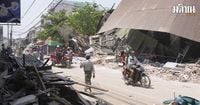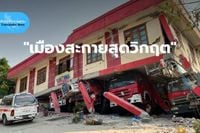On April 3, 2025, reports from Mae Sot, Tak Province, revealed ongoing challenges in providing aid to victims of the devastating 7.7 magnitude earthquake that struck Myanmar on March 28. Over six days have passed since the earthquake, and the situation for displaced people remains dire, with many still lacking access to essential resources.
According to the Associated Press, the death toll has tragically risen to 3,003, with more than 4,500 injured. In response to the crisis, Myanmar's military junta announced a temporary ceasefire on April 2, aimed at facilitating humanitarian assistance to those affected by the earthquake.
Despite this announcement, the situation on the ground continues to be precarious. A source from the area reported that while some aid is reaching Mae Sot, many residents are still reliant on makeshift conditions, sleeping on the streets and sourcing water from the Mae Nam Moei River. The lack of infrastructure and resources has made it challenging to deliver aid effectively.
Dan Pathanupath, a Thai representative in the ASEAN Intergovernmental Commission on Human Rights (AICHR), emphasized the need for assistance to reach all areas, regardless of control, stating that "the most important goal is to save lives, and it should not become a political issue." He urged all parties to cease hostilities temporarily to focus on humanitarian efforts.
Pathanupath further mentioned that during the upcoming AICHR meeting, he would propose discussions on enhancing humanitarian support for the displaced, respecting human rights principles in the process. He highlighted the urgent need for assistance to vulnerable populations and the role of the international community if Myanmar is unable to respond effectively.
In a related context, Subsakul Kijnuukura, a lecturer at Mahidol University, noted the importance of allowing media access to report on the earthquake and permitting humanitarian organizations to enter affected areas. He stressed that such actions could help reduce domestic conflict by prioritizing civilian needs.
However, the military's actions raise concerns about the sincerity of the ceasefire. Just hours before the announcement, reports indicated that the Myanmar military had conducted airstrikes against opposition forces near the Thai-Myanmar border, with the Karenni Army being targeted approximately 27 kilometers away from Mae Hong Son province.
As the situation develops, the international community is closely monitoring the Myanmar military's commitment to the ceasefire and whether it will genuinely facilitate humanitarian efforts. The Ministry of Foreign Affairs of Myanmar has stated that cooperation will be suspended until April 22, expressing concerns over the safety of aid delivery in conflict zones.
In the meantime, humanitarian agencies are working tirelessly to navigate the complexities of the situation. The need for a coordinated response is paramount, as millions remain in need of urgent assistance. The ongoing conflict complicates aid delivery, with fears that without proper measures, the situation could worsen.
As the world watches, the plight of those affected by the earthquake serves as a stark reminder of the humanitarian crises that persist in conflict zones. The call for a united effort to provide aid, free from political motivations, has never been more pressing.
In conclusion, the situation in Mae Sot and surrounding areas remains critical, with humanitarian needs growing daily. The international community must continue to advocate for the safety and well-being of those impacted by the earthquake and the ongoing conflict in Myanmar.






